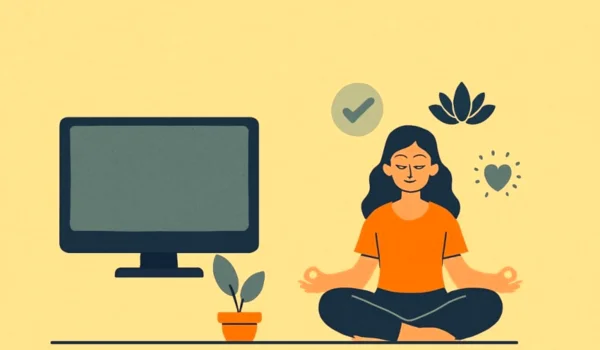In today’s digital world, it’s almost impossible to escape screens. From smartphones and laptops to TVs and tablets, we spend hours each day staring at glowing screens — for work, entertainment, or communication. But too much screen time can silently affect your body and mind, leading to eye strain, headaches, fatigue, and even poor sleep.
If you often feel mentally drained after long hours online, you’re not alone. The good news? With a few small changes, you can reduce screen-related stress and give your mind and eyes the rest they deserve.
In this post, we’ll explore what screen time stress is, how it affects your health, practical ways to reduce it, and answers to common questions people have about digital balance.
💡 What Is Screen Time Stress?
Screen time stress refers to the physical and mental strain that comes from prolonged exposure to digital devices. It’s not just about sore eyes — it includes mental fatigue, anxiety, and poor posture caused by constantly checking notifications, working long hours on computers, or binge-watching shows late at night.
The average person now spends over 6–8 hours per day looking at screens. That constant visual and cognitive load can overstimulate the brain, reduce focus, and disrupt your natural sleep cycle.
Luckily, adopting mindful digital habits can significantly ease these problems.
🌿 Health Benefits of Reducing Screen Time

Cutting down on screen use doesn’t mean disconnecting from the modern world — it means using technology in a healthier, more balanced way. Here’s what you’ll gain:
- Better Sleep Quality
Blue light from screens interferes with melatonin — the hormone that controls sleep. Reducing screen exposure (especially before bed) helps you fall asleep faster and enjoy deeper rest.
- Improved Eye Health
Less screen time means reduced digital eye strain, which causes dryness, blurred vision, and headaches. Your eyes get a much-needed break, improving comfort and focus.
- More Mental Clarity and Focus
Constant screen switching trains your brain to multitask — which lowers attention span. Taking screen breaks improves concentration and mental sharpness.
- Lower Stress and Anxiety
Social media and endless notifications can create mental overload. Spending less time online helps reduce anxiety, promotes mindfulness, and supports emotional balance.
- Better Posture and Physical Health
Screens often cause slouching or “tech neck.” Taking breaks and moving around improves blood circulation, muscle health, and posture.
- More Time for Real-Life Activities
Cutting screen time frees up hours you can invest in hobbies, family, or outdoor activities — all of which contribute to happier, healthier living.
🧘 Practical Tips to Reduce Screen Time Stress
Reducing screen time doesn’t have to be complicated. Start small, stay consistent, and notice how much better you feel.
Here are some easy, practical tips to help you reduce screen stress every day:
- Follow the 20-20-20 Rule
Every 20 minutes, look away from your screen and focus on something 20 feet away for 20 seconds.
This simple trick relaxes your eye muscles and prevents strain.
- Set Screen-Free Zones
Keep devices out of your bedroom, dining area, or relaxation spaces. This encourages mindful breaks and improves sleep hygiene.
- Take Frequent Digital Breaks
Try a 10-minute break every hour. Use this time to stretch, hydrate, or take a short walk. Even small breaks help your mind reset.
- Limit Social Media Time
Set daily app limits using your phone’s “Digital Wellbeing” or “Screen Time” settings.
You can also schedule “no-scroll” hours in your day — especially mornings and evenings.
- Adjust Screen Settings
- Lower your screen brightness to a comfortable level.
- Use blue light filters or night mode in the evening.
- Increase text size for easier reading.
- Engage in Offline Activities
Replace screen time with meaningful alternatives:
- Read a physical book 📖
- Go for a walk 🚶♂️
- Cook a new recipe 🍲
- Practice mindfulness or yoga 🧘♀️
- Unplug Before Bedtime
Stop using screens at least 1 hour before sleeping. Instead, listen to calm music, meditate, or write in a journal to unwind naturally.
- Use Technology Wisely
Use apps that track and limit screen time, or set reminders to take breaks. Tools like “Forest” and “Focus Mode” help you stay present.
🌟 Summary Table: Simple Habits to Reduce Screen Time Stress
| Habit | How It Helps |
| Follow 20-20-20 rule | Reduces eye strain and improves focus |
| Create screen-free zones | Promotes mindfulness and better rest |
| Take short breaks | Prevents fatigue and improves posture |
| Use blue light filters | Reduces glare and protects eyes |
| Limit social media | Lowers anxiety and improves mood |
| Unplug before bed | Promotes deeper, better-quality sleep |
| Engage in offline hobbies | Boosts creativity and mental well-being |
🕒 Sample Daily Routine for Digital Balance
Morning:
- Avoid checking your phone for the first 30 minutes.
- Do stretching, meditation, or a short walk.
Workday:
- Use the 20-20-20 rule.
- Take a 10-minute screen-free break every hour.
Evening:
- Read a book, call a friend, or cook dinner.
- Turn off screens at least 1 hour before bed.
Night:
- Keep your phone away from your bed.
- Try deep breathing or journaling before sleeping.
❓ Frequently Asked Questions (FAQs)
- How much screen time is too much?
Experts suggest limiting recreational screen time to less than 2 hours per day outside of work. Excessive use can lead to eye strain, sleep issues, and mental fatigue.
- Can blue light glasses help reduce screen stress?
Yes, blue light glasses can help reduce glare and minimize eye strain, especially if you work on digital devices for long hours. However, taking regular breaks is still essential.
- What are signs of too much screen time?
Common signs include dry eyes, headaches, neck pain, fatigue, poor sleep, and irritability. Mentally, you may feel distracted or anxious when away from your phone.
- How can I control my social media addiction?
Try deleting unnecessary apps, turning off notifications, setting daily usage limits, and replacing scrolling time with outdoor or creative activities.
- Can reducing screen time improve mood?
Absolutely! Less screen exposure — especially to stressful online content — reduces mental clutter, boosts focus, and helps you feel calmer and happier.
🌈 Final Thoughts
Screens are part of modern life, but how you use them determines your well-being. By adopting small, mindful habits — like setting limits, taking regular breaks, and disconnecting before bed — you can protect your eyes, improve focus, and regain balance in your day.
Start small today: take a few screen-free minutes, breathe deeply, and reconnect with the real world around you. Your body and mind will thank you! 💖

Hello, I’m Kapil Kumar, a seasoned SEO expert and blogger at WinnersList.in. My mission is to spotlight exceptional individuals and organizations across various domains. Through curated lists, profiles, and inspiring stories, I aim to celebrate outstanding achievements and inspire the next generation of champions. Join me in this journey.
